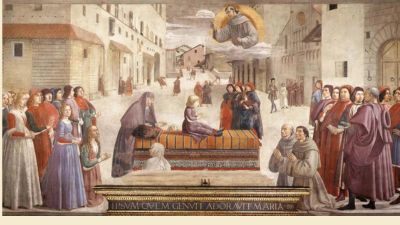A Reputation for Holiness
St. Francis of Assisi
Francis’ reputation for holiness began at home among the brothers away from the public eye. Often their first experience of his holiness was via his compassion for the brothers.

In previous articles we have been considering what awaited the men who came to join Francis of Assisi and this growing fraternity of believers seeking to follow Christ more fully in the world. We had mentioned there were no rules, regulations, or even a formation program; there was only Francis and the other brothers. But what drew the men to want to “come and see?” Undoubtedly, as today, a complex of reasons, but key among those reasons was Francis of Assisi’s reputation for holiness and miracles.
Francis’ reputation for holiness began at home among the brothers, not necessarily in the public square. The more “public” Francis was still a few years down the road when the reluctant saint began to be called more often to speak and appear and to increasingly gain public exposure. In the beginning, it was his brothers who experienced the holiness of Francis. First and foremost, Francis was a compassionate brother – especially for those who were tempted, spiritually troubled, or depressed. The medieval age was a time when these things were attributed to diabolical powers. Francis had a special gift for consoling those who suffered from such illnesses. Perhaps it stemmed, not only from the grace of God, but also arising out of Francis’ own experience of these same ailments.
One brother, an early and longtime companion of Francis, suffered from a spiritual dryness that plagued his prayer life, devotions, and life with the brothers. He resorted to fasting, scourging, and repeated confessions seeking to escape the spiritual desert. Francis noted that all these things were perpetuating the problem, making matters worse. Francis forbade the brother to go to confession and ordered him to limit his prayer and devotional life to seven “Our Fathers” a day. In a short time the dark cloud lifted from the brother’s life. As a result the brother reported to all who would listen about the holiness of Francis, which was seen in his ability to spiritually direct souls of the way of holiness and ability to perform miracles. There are many such stories from the early record of this reluctant saint. Reluctant? Yes, when honored or greeted as a saint, Francis would reply, “If at any moment the Lord wanted to take back the treasures he has loaned me, what would I have except a body and a soul, which even the non-believers have? I must believe, rather, that if the Lord had granted a thief and even a non-believer as many gifts as he has given me, they would be more faithful to the Lord than I.”
Once the reputation for holiness was common knowledge, the popular demand for miracles followed. On one occasion when a brother was suffering from seizures, Francis prayed over him as a simple act of piety. The illness departed, and the brother never again suffered from the malady. Word spread. A woman in Gubbio, long crippled, asked the friars to have Francis visit when next in the area. Ever tender hearted, Francis stopped by and the woman took the opportunity to touch his habit and was cured. Another woman at San Gemini was afflicted with epilepsy. Her husband came to Francis and asked for his intercession. What we know as epilepsy was considered demonic possession in medieval Italy. Fulfilling his Office of Deacon, Francis prayed an ad hoc prayer of exorcism, the demon departed and the woman returned to health. This and many other cures were ascribed to Francis’ saintly power.
Some of these reports are from somewhat early accounts. Other accounts appear later. For example, the earliest biographer of St. Francis – Thomas of Celano, who wrote the first account of the life of Francis for his canonization, some 25 years later also wrote, A Treatise on the Miracles of St. Francis (3C). It was not an original composition, rather Thomas borrowed from his earlier writings, the writings of other friars, and others from unknown sources; perhaps canonization testimony. In all, Thomas records 157 miracles and places them in an order that deftly paints a portrait of Francis as a “new man” through whom the Creator makes all things new (3C 1).
What did Francis think of all these accounts? He felt they were all serious temptations of the spirit. He once referred to them as “flies,” the same label he used for troublesome brothers. Yet at the same time he recognized the giftedness was from God and to use them was to be faithful to God’s plans and not his own. And in that recognition lays the foundation of saintliness.